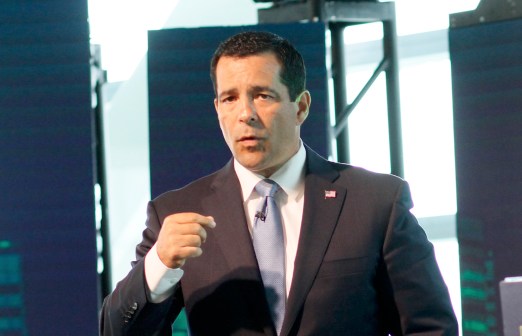Lawmakers: New background check bureau ‘designed to fail’

A number of lawmakers find fault with the administration’s proposal for a new federal bureau to oversee background checks of government employees and contractors, and members of the House Oversight Committee chastised federal officials Thursday about the project’s setup, organizational chart and proposed funding.
Acting Office of Personnel Management Director Beth Cobert, U.S. CIO Tony Scott, Defense Department CIO Terry Halvorsen, and Director of the National Counterintelligence and Security Center Bill Evanina told the committee that the four offices represented at Thursday’s hearing were all working diligently to create the policies and organizational protocols behind the National Background Investigations Bureau.
The NBIB, which will replace the Federal Investigations Service, was created after multiple breaches of OPM systems compromised the personal information on millions of current and former federal employees.
Committee members admonished the panel for everything from the $95 million allocated for the NBIB in President Barack Obama’s 2017 budget request to the unrelated question of why OPM hasn’t yet integrated social media audits into the background check process.
“I think we are headed for another disaster,” said Rep. John Mica, R-Fla. “This is designed to fail. We will be back here, the next Congress and 2017, and I guaran-damn-tee you, this will continue to be a disaster.”
The NBIB would be housed inside OPM, but DOD would be responsible for standing up the bureau’s IT infrastructure. At the hearing, Halvorsen said he believes the NBIB would start operations in 2017, with the Defense Information Systems Agency responsible for providing the majority of the technology.
Rep. Steve Russell, R-Okla., took exception with this structure along with the amount of money the administration is requesting when the DOD is looking to make cuts in other areas.
“For $95 million, you could have 60,600 soldiers being paid,” Russell said. “We are weakening our country, we are weakening the Department of Defense and whomever might have a security clearance. I don’t think the solution is to take [funding] out of the top line of the Department of Defense.”
The technical details for the NBIB have yet to be determined, including what level of protection would be placed upon the bureau’s system. However, when asked by Rep. Gerry Connolly, D-Va., if the system would use the Department of Homeland Security’s Einstein system, Halvorsen would not commit to using the intrusion detection and protection tool.
“It will deploy the right set of sensors — it could be Einstein-equivalence or it could be better,” Halvorsen told Connolly. “This is a field that changes rapidly. There will not be a single system but an integrated layer of systems better integrated to stop attacks, and if they happen, it will quarantine them quickly.”
As to the policy that will dictate background checks, the panel also said they were working through reforms to security clearances methods via the Performance Accountability Council. However, Oversight Committee Chairman Rep. Jason Chaffetz, R-Utah, lambasted Evanina when he couldn’t explain why the government has no policy in place regarding the social media accounts of prospective employees.
“As we’re doing a background investigation, how could you not go look at their Facebook page, or their Twitter posts, or their Instagram, or Snapchat, or any of the other ones?” Chaffetz said. “Go hire a bunch of teenagers, and they’d do it better than we’re doing it. ISIS has figured it out — they know how to do it. But we don’t seem to do it.”
[Read More: More cash for new IT in 2017 federal budget plan]
Chaffetz also took exception to the state of IT spending across the entire federal government, saying the country has dumped $525 billion over the past seven years into agency systems that are still prone to attack. In response, Scott addressed the IT modernization fund, which would give spending incentives to agencies who look to move towards more modern infrastructure solutions.
The chairman called that proposal “hogwash.”
“To suggest we are just $3 billion from solving this problem is ridiculous,” Chaffetz said.
Contact the reporter on this story via email at greg.otto@fedscoop.com, or follow him on Twitter at @gregotto. His OTR and PGP info can be found here. Subscribe to the Daily Scoop for stories like this in your inbox every morning by signing up here: fdscp.com/sign-me-on.






